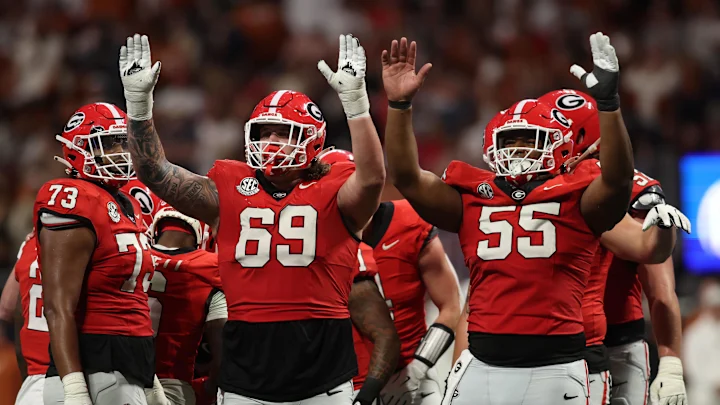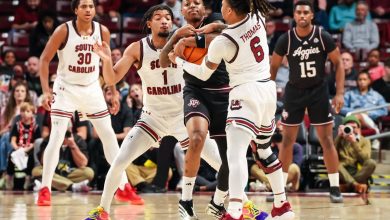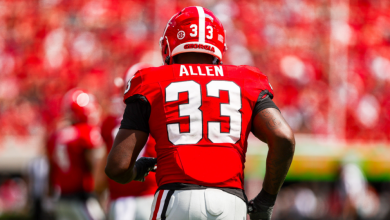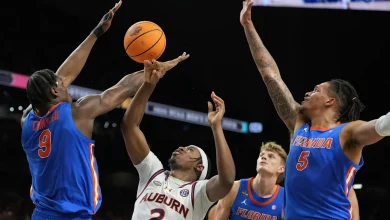‘Down Year’ for Bulldogs Offense Explained by Georgia OL Tate Ratledge

In a season filled with ups and downs for the Georgia Bulldogs, one of the most discussed topics has been the performance of their offensive unit. Despite a series of wins and a solid overall record, Georgia’s offense has been labeled as having a “down year” by many fans and analysts alike. For a program that has come to expect explosive, high-powered performances under head coach Kirby Smart, this offensive dip has sparked a wide array of questions and concerns.
As one of the premier programs in college football, Georgia’s offense has often been the centerpiece of their success. From their quarterbacks to their running backs and wide receivers, Georgia has always had the talent to move the ball efficiently and put up points. However, the 2024 season has seen this offense struggle to maintain the consistency and dominance it has previously shown, especially in comparison to the team’s defense, which remains one of the best in the country.
Tate Ratledge, a standout offensive lineman for the Bulldogs, has been a key figure in this offensive transition. As a leader on the offensive line and one of the most experienced players on the unit, Ratledge is in a unique position to offer insight into why the offense has underperformed this season. In this article, we will explore Ratledge’s perspective on Georgia’s offensive struggles, what has gone wrong for the Bulldogs in 2024, and how they can adjust to meet the high expectations set by the program.
The Expectations for Georgia’s Offense
Before diving into the specifics of Georgia’s “down year” offensively, it’s important to contextualize the program’s recent success and expectations. Over the past several seasons, Georgia has emerged as one of the most dominant programs in college football, winning back-to-back College Football Playoff (CFP) championships and consistently finishing among the top teams in the SEC and the nation.
At the heart of Georgia’s success during these championship years was a potent offense that was balanced, efficient, and explosive. The Bulldogs featured a solid quarterback play, a dynamic rushing attack, and a strong group of pass-catchers. This balance allowed Georgia to control the clock, move the ball down the field with ease, and score at will against most of their opponents.
This year, however, things have been different. Georgia has struggled to maintain the same offensive dominance that had become a hallmark of their identity. With injuries, inconsistent play from key positions, and the departure of several star players to the NFL, the Bulldogs’ offense has faltered at times, and their usually high-scoring games have been replaced with more pedestrian results.
In an era where offensive production is critical to winning championships, Georgia’s offensive struggles have raised serious questions about their chances of competing for another national title in 2024.
Tate Ratledge: An Inside Look at the Struggles
Tate Ratledge is a cornerstone of the Bulldogs’ offensive line, and as one of the more seasoned players on the team, his perspective on the offense’s struggles carries significant weight. As an offensive lineman, Ratledge is directly involved in nearly every play, whether it be in pass protection or opening up running lanes for Georgia’s running backs. His leadership on the offensive line has been critical to the team’s offensive success in the past, and in 2024, his insights on the issues faced by the offensive unit provide a unique lens through which to analyze the team’s performance.
In a recent interview, Ratledge was candid about the offensive struggles that have plagued the Bulldogs this season. According to Ratledge, several factors have contributed to the drop-off in offensive production, with a combination of personnel changes, injuries, and a lack of execution playing a central role.
Injuries and Personnel Changes
One of the most immediate factors in Georgia’s offensive struggles has been the injury bug that has affected several key players. For any team, injuries to important positions can derail an entire season, and for Georgia, the offensive line has been especially affected. Ratledge acknowledged that injuries have made it difficult to maintain continuity on the line, which has in turn affected the team’s ability to establish a consistent rushing attack.
“The offensive line is the heartbeat of our offense, and when we don’t have all the pieces in place, it’s tough,” Ratledge said. “We’ve had to deal with some injuries and some reshuffling, and that’s had an impact on the running game and on pass protection. When we’re not firing on all cylinders up front, it puts a lot of pressure on the rest of the offense.”
In addition to injuries along the offensive line, Georgia’s quarterback situation has also been a source of instability. With Carson Beck stepping into the starting role after the departure of Stetson Bennett, the offense has had to adjust to a new leader under center. While Beck has shown promise, his performance has not been as consistent as Bennett’s during the Bulldogs’ championship years. This lack of continuity at quarterback has been another key reason why Georgia’s offensive execution has been subpar.
Ratledge is quick to point out that while these injuries and personnel changes have made things more difficult, the team cannot use them as excuses for their struggles. “At the end of the day, we have to execute better,” he explained. “Injuries happen, and it’s part of the game, but we still have a job to do. We have to find a way to overcome those obstacles and perform at the level Georgia football is known for.”
Inconsistent Execution
Beyond injuries and personnel changes, Ratledge also highlighted the issue of inconsistent execution as a major factor contributing to Georgia’s offensive struggles. Despite having talented players at key positions, the Bulldogs have not been able to put together consistent drives or finish plays in the red zone. Whether it’s missed opportunities in the passing game, penalties that stall drives, or missed blocks in the running game, the Bulldogs have repeatedly found themselves in situations where they fail to capitalize on scoring chances.
“We have the talent to be explosive, but we haven’t been executing like we should,” Ratledge admitted. “There are too many mental errors, missed assignments, and times when we’ve failed to finish plays. We know we’re capable of doing better, but we have to clean up those mistakes to take that next step.”
This inconsistency in execution has been particularly evident in Georgia’s struggles in the red zone. The Bulldogs have often had difficulty finishing drives, especially when they’ve had opportunities to score from close range. Ratledge acknowledged that the team needs to be more disciplined and focused in these crucial moments, where every point counts.
“We have to be more efficient when we get inside the 20-yard line. We’ve had too many drives stall out in the red zone, and that’s something we have to address,” Ratledge said. “If we want to be the team we know we can be, we have to execute better in those key situations.”
Adapting to a New Offensive Identity
Another factor in Georgia’s offensive struggles has been the adaptation to a new offensive identity. Under Kirby Smart, Georgia has traditionally been known for a power-running game complemented by efficient passing. However, with the departure of key playmakers and the need to adjust to new personnel, the Bulldogs’ offense has struggled to establish its typical rhythm this season.
“The offense has had to evolve this year,” Ratledge explained. “We’ve had some changes, and we’ve been trying to find the right balance between the run and the pass. There have been times when we’ve been too one-dimensional, and other times when we’ve tried to force things. Finding that balance is key for us moving forward.”
For Ratledge and the offensive line, this balance is crucial. As the team’s offensive line has been tasked with protecting the quarterback and opening holes for the running backs, maintaining a balance between the run and pass has been essential to keeping defenses off balance. Without the ability to establish a strong running game, Georgia’s passing attack becomes more predictable, which has allowed defenses to focus on shutting down the passing lanes.
“Being able to run the ball consistently opens up so much for our offense. When we can establish the run, it helps with play-action, it gives our quarterbacks more time, and it puts less pressure on the passing game,” Ratledge said. “When we’re not able to do that, everything becomes harder.”
Looking Ahead: A Path to Improvement
While Georgia’s offense has certainly faced challenges in 2024, Ratledge remains optimistic about the team’s ability to improve. He emphasized that the Bulldogs have the talent and the leadership to bounce back and finish the season strong.
“We have everything we need to succeed,” Ratledge said. “We have the talent, the coaching, and the drive to get better. It’s just about coming together, cleaning up the mistakes, and playing with the kind of intensity and focus that Georgia football is known for.”
For Ratledge, the key to turning things around will be addressing the mental errors, improving execution, and reestablishing the team’s identity. As one of the leaders on the team, he knows that it starts with the offensive line setting the tone for the rest of the offense. If Georgia can get back to their fundamentals, regain balance, and improve their execution, they have the potential to become the dominant offense they’ve been in previous seasons.









